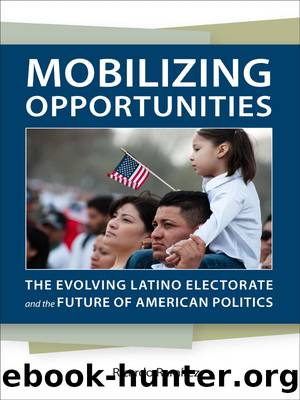Mobilizing Opportunities: The Evolving Latino Electorate and the Future of American Politics by Ricardo Ramírez

Author:Ricardo Ramírez [Ramírez, Ricardo]
Language: eng
Format: epub
Tags: Political Science, History & Theory
ISBN: 9780813935119
Google: LeprAAAAQBAJ
Goodreads: 18737328
Publisher: University of Virginia Press
Published: 2013-11-04T00:00:00+00:00
Research on Latino turnout emphasizes the role of socioeconomic characteristics on turnout. Will education and age continue to be significant determinants of Latino voter participation if an increasing segment of the potential pool of Latino voters is much younger and less educated than other racial/ethnic groups? In California, as of the year 2010, SES indicators continue to be relevant. Although they may not have the greatest effects on turnout, they are the most consistent predictors of turnout. They are also important characteristics associated with very high (⥠75 percent) turnout among Latinos. In addition, the positive effects of organizational affiliation and the noneffects of partisan affiliation on turnout suggest that either Latinos react more favorably to mobilization by nonpartisan organizations, or political parties have not yet made the necessary investment in Latino voter mobilization efforts. Given the increased percentage of labor union participation among Latinos,39 and the increased role of labor in California elections and politics, the implications could be far-reaching.
While previous research on the patterns of participation of native-born and naturalized Latinos suggests that there are differences in participation, it does fully delineate these differences. The often-neglected variables that may be determinative of turnout among naturalized Latinos include national-origin differences, length of residence in the United States, and when Latinos first enter the electorate. This chapter makes the case that turnout in the 1990s in California can be largely explained by the latter variable. By utilizing unique measures of registration cohort, nativity, and their interaction, this chapter addresses the intricacies related to gauging the effects of a perceived and real anti-Latino political context on naturalized and native-born Latinos. More importantly, this innovative approach suggests that political context can have long-term mobilizing implications for Latinos entering the electorate in response to such a context, and that the mobilization is greater and longer-lasting among the naturalized within this cohort. This finding may be particularly relevant to future contexts of anti-Latino sentiment in other states, especially those that are going through rapid demographic transformation due to the influx of Latino immigrants.
Furthermore, although the surge in the number of naturalized Latinos in California may have been affected by (1) the increased pool of Latinos eligible for citizenship because of IRCA; (2) the INS Green Card replacement program; and (3) welfare reform and Propositions 187, 209, and 227, we must be skeptical of how and when these are used to explain the changing citizen population. In fact, the above explanations have been used interchangeably not only to explain the increased pool of naturalized Latinos but also the increased number of Latinos registered to vote and of those actually turning out to vote. While this assumes that the above factors impacted all Latinos in a similar way by mobilizing them to naturalize, register, and vote, consistent with the 2000 PPIC report (Johnson et al. 1999) and Pantoja, RamÃrez, and Seguraâs (2001) findings, this chapter suggests that âthe changing California voterâ is largely the result of the influx of naturalized Latinos entering the electorate between 1994 and 1996 and voting at greater rates than other cohorts of Latino voters.
Download
This site does not store any files on its server. We only index and link to content provided by other sites. Please contact the content providers to delete copyright contents if any and email us, we'll remove relevant links or contents immediately.
The Secret History by Donna Tartt(19085)
The Social Justice Warrior Handbook by Lisa De Pasquale(12190)
Thirteen Reasons Why by Jay Asher(8909)
This Is How You Lose Her by Junot Diaz(6885)
Weapons of Math Destruction by Cathy O'Neil(6279)
Zero to One by Peter Thiel(5801)
Beartown by Fredrik Backman(5751)
The Myth of the Strong Leader by Archie Brown(5507)
The Fire Next Time by James Baldwin(5442)
How Democracies Die by Steven Levitsky & Daniel Ziblatt(5218)
Promise Me, Dad by Joe Biden(5153)
Stone's Rules by Roger Stone(5087)
A Higher Loyalty: Truth, Lies, and Leadership by James Comey(4960)
100 Deadly Skills by Clint Emerson(4924)
Rise and Kill First by Ronen Bergman(4788)
Secrecy World by Jake Bernstein(4752)
The David Icke Guide to the Global Conspiracy (and how to end it) by David Icke(4717)
The Farm by Tom Rob Smith(4507)
The Doomsday Machine by Daniel Ellsberg(4490)
